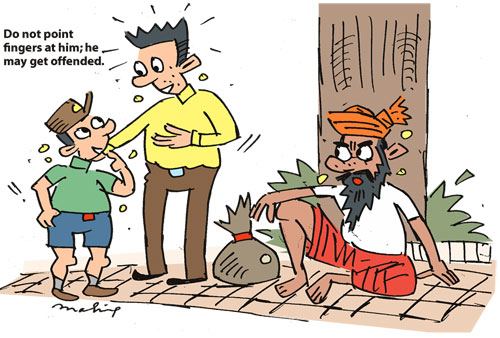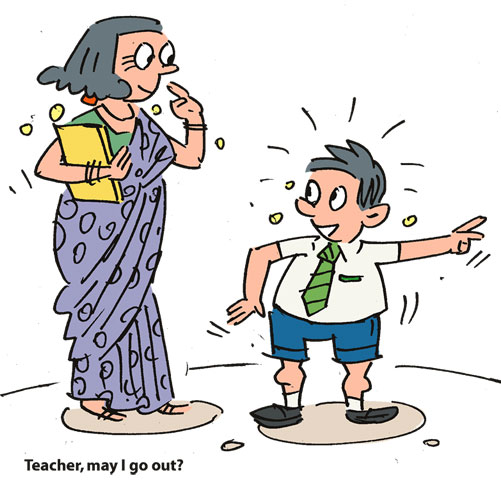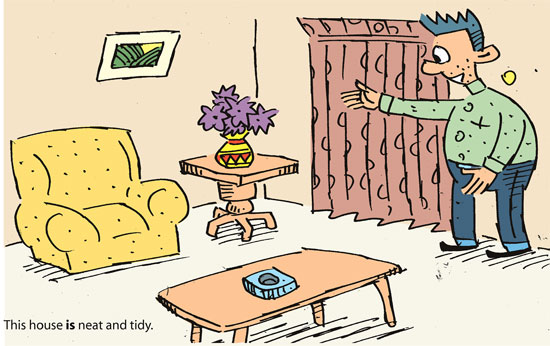|

by R. S. Karunaratne
The correct use of ‘may’ and ‘might’
We may live without poetry, music and art;
We may live without conscience, and live without heart;
We may live without friends, we may live without books;

But civilised man cannot live without cooks.
-Owen Meredith
` May’ is a modal verb. It is used to express possibility.
I may see you before I leave for London.
The motive for the killing may never be discovered.
The explosion may have been caused by a bomb.
Do not point fingers at him; he may get offended.
There may be some eye-witnesses but they do not come forward to give
evidence.
In formal English we use ‘may’ to ask or give permission.
Teacher, may I go out?
A reader may borrow up to three books at any one time.
May I help myself to some more ice cream?
How may I help you, young lady?
You may go home now if you are not feeling well.
We use ‘may’ to introduce a wish or hope.
May you live long!
May you be blessed with happiness and prosperity!
May he attain Nibbana!
May you have a fruitful marriage!
May all beings be happy!
‘May’ and ‘maybe’
‘May’ and ‘be’ appear together as two separate words when they are
used as verbs.
I may be late for the meeting today.
The adverb ‘maybe’ is always written as one word.
Maybe I shouldn’t get involved in financial deals.
`May’ or ‘can’
We use ‘may’ to talk about the possibility of something that will
happen.
It may rain today.
We use ‘can’ if something is certain to happen.
I can go to office by train.
Maybe
We use ‘maybe’, written as one word, to show that something is
possible or that something might be true.
Maybe she’ll get the appointment.
Maybe what you say is right.

We use ‘maybe’ informally to show that a number or amount is
approximate.
There were 40, maybe 45 students in the classroom.
We use ‘maybe’ to avoid giving a direct answer.
A: Are you coming to the Christmas party?
B: Maybe.
‘Might’
‘Might’ is a modal verb and it is the past tense of ‘may.’ We use it
to report what somebody has said.
I went to meet him on Sunday thinking that he might be at home.
Gemunu asked whether he might be allowed to go home early.
We use ‘might’ to express the possibility of something happening.
I might sit the examination this year if I can complete the syllabus.
‘Might’ is used to ask for permission.
Might I ask you a question, Sir?
‘Might’ is used to make a suggestion.
I thought you might join the Toastmasters Club.
Starters:
State and action verbs
Verbs can be divided into two categories: State verbs and action
verbs. A state verb means something staying the same. An action verb
means something happening. As a general rule, state verbs are not used
in the progressive tenses.
State verbs
This house is neat and tidy.
Raj owns a tea estate.
The box contains apples.
We are in the classroom.
I don't believe what you say.
This pen belongs to Sunil.
The book consists of 10 chapters.

We can't depend on them for financial assistance.
You get what you deserve.
Do you think ghosts exist?
I hate his guts.
She knows what to do in an emergency.
I like classical music.
Children love their parents.
What he says matters to me.
What do you mean by that?
Students need time to prepare for examinations.
She prefers tea to coffee.
I will always remember you.
He seems to be a kind person.
I don't understand what you say.
Action verbs
Action verbs can be simple or progressive.
Latha is polishing the floor.
The farmers are ploughing the field.
He put the letter into the postbox.
I am thinking about the problem.
They are having breakfast.
She is coming from Denmark.
We usually travel by train.
I see Amanda at the communication centre quite often.
I was looking at your photograph.
Malani appeared in many films.
They weighed my bags at the airport.
He is fitting a lock to the door.
We use state verbs in the progressive to talk about a short period of
time.
We are enjoying the party.
You're looking glamorous!
We're feeling a bit sad about your departure.
[Activity]
Say which verbs express states and which express actions. Check your
answers with the key.
1. I surf the Internet very often.
..........................................................................
2. My house is on the top of a hill.
..........................................................................
3. Father drives his car to office.
.........................................................................
4. He owns two vehicles.
.........................................................................
5. We go to parties on every Sunday.
..........................................................................
6. He plays football in the evening.
..........................................................................
7. What are you looking at?
............................................................................
8. I'm coming from England.
............................................................................
9. He is weighing my parcel.
............................................................................
10.You're a nice girl.
.........................................................................
-----------
Key:
1.Action 2. State 3. Action 4. State 5. Action 6. Action 7. Action 8.
Action 9. Action 10. State
Form adverbs from nouns
Words often come in families. You can expand your vocabulary by
becoming familiar with these word families. We give 25 nouns in Column
A. Write the relevant adverbs in Column B. Check your answers with the
key.
Column A Column B
1. enlargement ..................................
2. laughter ..................................
3. law ..................................
4. laziness ..................................
5. legality ..................................
6. length ..................................
7. life ..................................
8. light ..................................
9. likelihood ..................................
10. liveliness ..................................
11. location ..................................
12. love ..................................
13. low ...............................
14. luck ..................................
15. machine ..................................
16. magic ...............................
17. man ..................................
18. mark ...............................
19. match ..................................
20. material ...............................
21. meaning ..................................
22. measure ..................................
23.medicine ..................................
24.memory ..................................
25.mentality ..................................
Key:
1.largely 2. laughably 3. lawfully 4. lazily 5. legally 6. lengthily
7. lifelessly 8. lightly 9. likely 10. live 11. locally 12. lovingly 13.
low 14. luckily 15. mechanically 16. magically 17. manfully 18. markedly
19. matchlessly 20. materially 21. meaningfully 22. immeasurably 23.
medically 24. memorably 25. mentally |

